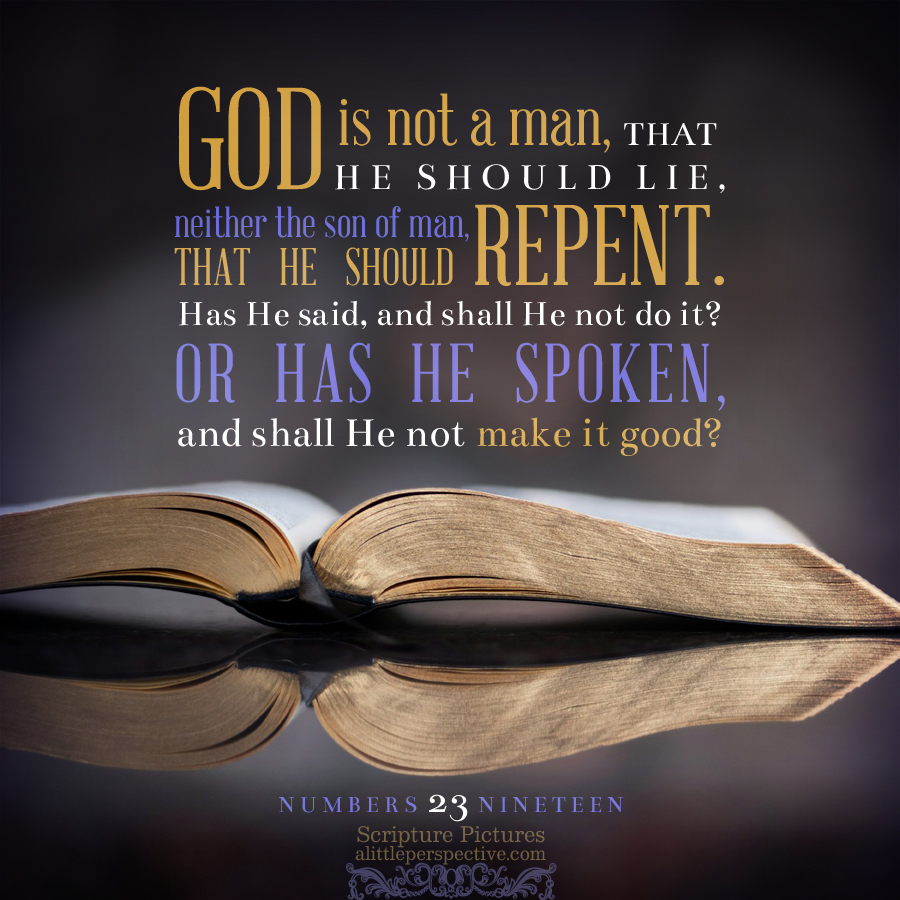Read Numbers 23 here (text coming …) or at Bible Gateway.
The Hebrew paragraphs:
22:2-24:25 {p} Balak and Balaam
God is not a man, that He should lie; neither the son of man, that He should repent. When He has said it, will He not do it? Or when He has spoken, will He not make it good? Num 23:19
Hebrew Root Words parables:
To (not) lie is Strong’s H3576 כזב kazab; a primitive root meaning, “to lie.” The ancient pictographs are kaph + zayin + bet.
kaph כ, ך = the open palm, thus bend, open, allow, tame
zayin ז = the mattock, thus tool, food, cut, nourish
bet ב = the house, thus house, household, family, in, within
The story: A bent (kaph) tool (zayin), that is, something useless that does not function as intended (bet, the floor plan of the house, thus something planned signifying intent). Webster’s says that to lie is to make an untrue statement with the intent to deceive.
To (not) repent is Strong’s H5162 נהם nacham; a primitive root meaning, “to give comfort, to have sorrow.” The ancient pictographs are nun + chet + mem.
nun נ, ן = the seed, thus continue, heir, son
chet ח = the wall, thus outside, divide, half
mem מ, ם = the water, thus chaos, mighty, blood
To continue (nun) outside (chet), that is, to rest at pasture, as the shepherd took his flocks outside their enclosure for the season, to find good pasture. The addition of the mem brings to mind:
YHVH is my shepherd; I shall not want. He makes me to lie down in green pastures; He leads me beside the still waters. Psa 23:1-2
Thus the parable: To rest in green pastures (nun + chet) and still waters (mem). The positive spin on the verb is to give comfort. The negative spin is to have sorrow, to have regret. Webster’s says that to repent is to feel regret or contrition, so that one changes one’s mind.
The Teaching Tool of Learning from the Narrative is giving us foundational truths on which to build our lives.
Truth 1: God does not lie nor repent His words. The word which comes from His mouth is a true word.
This means that no matter how unbelievable something He says might seem, it is the true description of reality. It is so sure of happening that it is as if it is already done. When He says, “Yes, I have loved you with an everlasting love; therefore with lovingkindness I have drawn you;” (Jer 31:3) He is truth-telling.
Truth 2: Satan does not tell the truth (Joh 8:44). The word which comes from his mouth is a false word.
This means that no matter how believable something he says might seem, it is the absolute false description of reality. When he says, “There is no hope for you now;” he is lying. He is making an untrue statement with the malicious intent to deceive.
We tell the difference between the two by knowing the truth—God’s Word—so thoroughly that we immediately recognize a contradiction to its factual statements.
If there are questions, these are good resources:
God’s Word is unfailing – Christine Miller
God’s Word applies to me – Christine Miller
Lies are not harmless – Christine Miller
There is too much, let me sum up – Christine Miller

















Leave a Reply